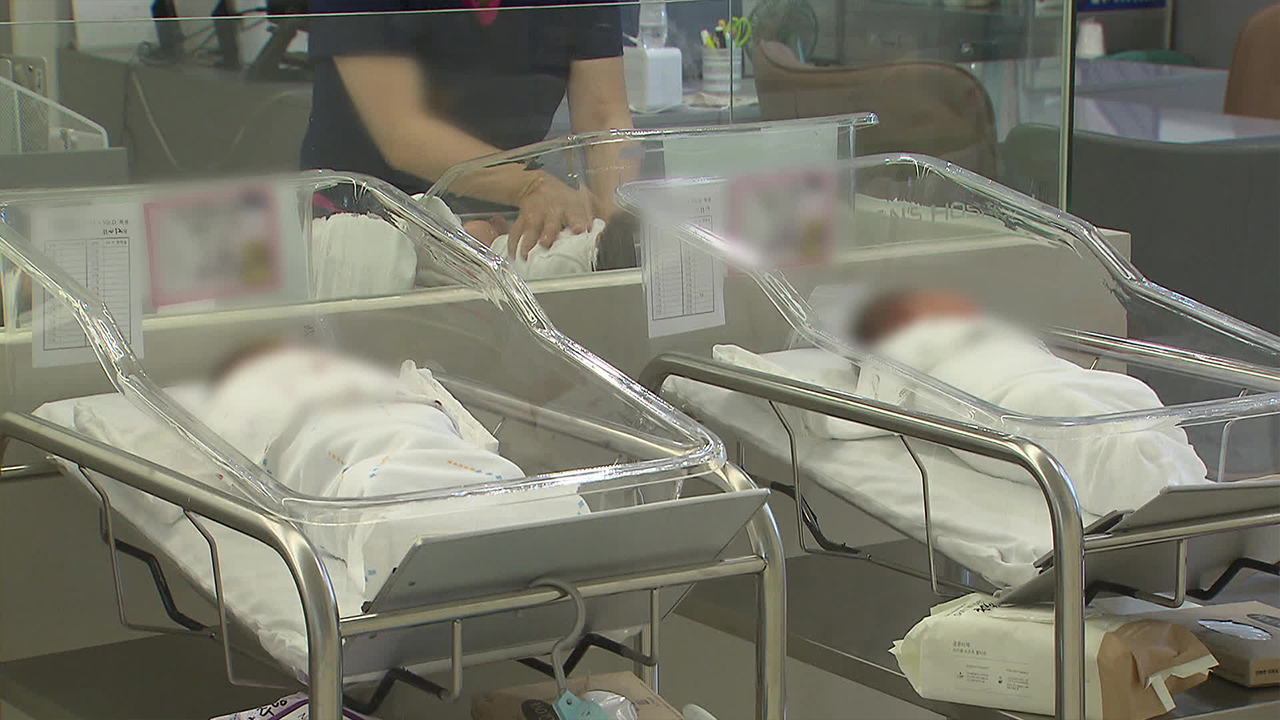Births by September surpass same period last year
입력 2024.11.28 (00:12)
읽어주기 기능은 크롬기반의
브라우저에서만 사용하실 수 있습니다.
[Anchor]
Due to the unprecedentedly rapid decline in birth rates, a national population emergency has been declared this year, and KBS is also participating in crisis response.
Following this proactive response, statistics were released showing that the number of births in September increased by more than 10% compared to a year ago.
The cumulative number of births up to September has surpassed the same period last year, marking a clearer sign of reversal in the increasingly serious low birth rate situation.
Kim Jin-hwa reports.
[Report]
At the parenting products fair, visits have significantly increased, not only from parents with babies but also from prospective parents.
The number of visitors, which had sharply decreased during COVID-19, has recently recovered.
[Nam Dong-jun/Fair Organizing Team Leader: "(Compared to last year?) There is a big difference. I understand that the birth rate and marriage rate have increased quite a bit."]
The number of births in September increased by 10.1% compared to a year ago, continuing an upward trend for three consecutive months.
As of September this year, more than 178,000 births have been recorded, surpassing the same period last year.
The annual number of births is poised to rebound for the first time in nine years, surpassing last year's figures.
The increase in the population in their 30s, along with the rise in marriages after COVID-19, is believed to have led to an increase in births.
[Lee Hye-mi/Expected to give birth in Mar. 2025: "I got married in March last year. From the beginning of our relationship, we planned to have at least two children."]
The total fertility rate for the third quarter also recorded an increase of 0.05 to 0.76 compared to last year.
The Statistics Korea previously projected that this year's total fertility rate would be 0.68, hitting a low next year before rising in 2026, but the possibility of the bottom and rebound point being advanced by two years has increased significantly.
[Lim Young-il/Director of Vital Statistics Division, Statistics Korea: "Based on the current trend, it seems that the total fertility rate will increase slightly to around 0.72 to 0.74 compared to the previous year."]
The number of marriages, a leading indicator of births, also recorded the highest growth rate ever for the third quarter.
This is KBS News, Kim Jin-hwa.
Due to the unprecedentedly rapid decline in birth rates, a national population emergency has been declared this year, and KBS is also participating in crisis response.
Following this proactive response, statistics were released showing that the number of births in September increased by more than 10% compared to a year ago.
The cumulative number of births up to September has surpassed the same period last year, marking a clearer sign of reversal in the increasingly serious low birth rate situation.
Kim Jin-hwa reports.
[Report]
At the parenting products fair, visits have significantly increased, not only from parents with babies but also from prospective parents.
The number of visitors, which had sharply decreased during COVID-19, has recently recovered.
[Nam Dong-jun/Fair Organizing Team Leader: "(Compared to last year?) There is a big difference. I understand that the birth rate and marriage rate have increased quite a bit."]
The number of births in September increased by 10.1% compared to a year ago, continuing an upward trend for three consecutive months.
As of September this year, more than 178,000 births have been recorded, surpassing the same period last year.
The annual number of births is poised to rebound for the first time in nine years, surpassing last year's figures.
The increase in the population in their 30s, along with the rise in marriages after COVID-19, is believed to have led to an increase in births.
[Lee Hye-mi/Expected to give birth in Mar. 2025: "I got married in March last year. From the beginning of our relationship, we planned to have at least two children."]
The total fertility rate for the third quarter also recorded an increase of 0.05 to 0.76 compared to last year.
The Statistics Korea previously projected that this year's total fertility rate would be 0.68, hitting a low next year before rising in 2026, but the possibility of the bottom and rebound point being advanced by two years has increased significantly.
[Lim Young-il/Director of Vital Statistics Division, Statistics Korea: "Based on the current trend, it seems that the total fertility rate will increase slightly to around 0.72 to 0.74 compared to the previous year."]
The number of marriages, a leading indicator of births, also recorded the highest growth rate ever for the third quarter.
This is KBS News, Kim Jin-hwa.
■ 제보하기
▷ 카카오톡 : 'KBS제보' 검색, 채널 추가
▷ 전화 : 02-781-1234, 4444
▷ 이메일 : kbs1234@kbs.co.kr
▷ 유튜브, 네이버, 카카오에서도 KBS뉴스를 구독해주세요!
- Births by September surpass same period last year
-
- 입력 2024-11-28 00:12:43

[Anchor]
Due to the unprecedentedly rapid decline in birth rates, a national population emergency has been declared this year, and KBS is also participating in crisis response.
Following this proactive response, statistics were released showing that the number of births in September increased by more than 10% compared to a year ago.
The cumulative number of births up to September has surpassed the same period last year, marking a clearer sign of reversal in the increasingly serious low birth rate situation.
Kim Jin-hwa reports.
[Report]
At the parenting products fair, visits have significantly increased, not only from parents with babies but also from prospective parents.
The number of visitors, which had sharply decreased during COVID-19, has recently recovered.
[Nam Dong-jun/Fair Organizing Team Leader: "(Compared to last year?) There is a big difference. I understand that the birth rate and marriage rate have increased quite a bit."]
The number of births in September increased by 10.1% compared to a year ago, continuing an upward trend for three consecutive months.
As of September this year, more than 178,000 births have been recorded, surpassing the same period last year.
The annual number of births is poised to rebound for the first time in nine years, surpassing last year's figures.
The increase in the population in their 30s, along with the rise in marriages after COVID-19, is believed to have led to an increase in births.
[Lee Hye-mi/Expected to give birth in Mar. 2025: "I got married in March last year. From the beginning of our relationship, we planned to have at least two children."]
The total fertility rate for the third quarter also recorded an increase of 0.05 to 0.76 compared to last year.
The Statistics Korea previously projected that this year's total fertility rate would be 0.68, hitting a low next year before rising in 2026, but the possibility of the bottom and rebound point being advanced by two years has increased significantly.
[Lim Young-il/Director of Vital Statistics Division, Statistics Korea: "Based on the current trend, it seems that the total fertility rate will increase slightly to around 0.72 to 0.74 compared to the previous year."]
The number of marriages, a leading indicator of births, also recorded the highest growth rate ever for the third quarter.
This is KBS News, Kim Jin-hwa.
Due to the unprecedentedly rapid decline in birth rates, a national population emergency has been declared this year, and KBS is also participating in crisis response.
Following this proactive response, statistics were released showing that the number of births in September increased by more than 10% compared to a year ago.
The cumulative number of births up to September has surpassed the same period last year, marking a clearer sign of reversal in the increasingly serious low birth rate situation.
Kim Jin-hwa reports.
[Report]
At the parenting products fair, visits have significantly increased, not only from parents with babies but also from prospective parents.
The number of visitors, which had sharply decreased during COVID-19, has recently recovered.
[Nam Dong-jun/Fair Organizing Team Leader: "(Compared to last year?) There is a big difference. I understand that the birth rate and marriage rate have increased quite a bit."]
The number of births in September increased by 10.1% compared to a year ago, continuing an upward trend for three consecutive months.
As of September this year, more than 178,000 births have been recorded, surpassing the same period last year.
The annual number of births is poised to rebound for the first time in nine years, surpassing last year's figures.
The increase in the population in their 30s, along with the rise in marriages after COVID-19, is believed to have led to an increase in births.
[Lee Hye-mi/Expected to give birth in Mar. 2025: "I got married in March last year. From the beginning of our relationship, we planned to have at least two children."]
The total fertility rate for the third quarter also recorded an increase of 0.05 to 0.76 compared to last year.
The Statistics Korea previously projected that this year's total fertility rate would be 0.68, hitting a low next year before rising in 2026, but the possibility of the bottom and rebound point being advanced by two years has increased significantly.
[Lim Young-il/Director of Vital Statistics Division, Statistics Korea: "Based on the current trend, it seems that the total fertility rate will increase slightly to around 0.72 to 0.74 compared to the previous year."]
The number of marriages, a leading indicator of births, also recorded the highest growth rate ever for the third quarter.
This is KBS News, Kim Jin-hwa.
-
-

김진화 기자 evolution@kbs.co.kr
김진화 기자의 기사 모음
-
이 기사가 좋으셨다면
-
좋아요
0
-
응원해요
0
-
후속 원해요
0















이 기사에 대한 의견을 남겨주세요.